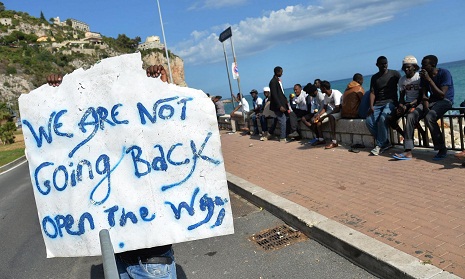Europe has become embroiled in a worsening feud over the issue, with Italy threatening to issue migrants with temporary visas that would allow them to enter other EU countries if no equitable deal is struck to share the burden.
Brussels is struggling to bring in a new quota system for migrants. The ministers will try to hammer out a response to controversial proposals from the European commission that amount to the beginnings of a coherent and shared immigration policy.
With tens of thousands of migrants crossing the Mediterranean, most of them heading for Italy, Rome appears outraged at the European infighting and is threatening to retaliate.
East European states reject the commission’s proposals, Britain and Denmark are opting out; Germany supports them; France, Spain and Portugal are lukewarm; and Italy is furious that it may be left to deal with the influx on its southern shores.
The Italian prime minister, Matteo Renzi, said that if no equitable deal is struck, Rome would start issuing migrants with temporary visas allowing them to travel elsewhere in Europe, stop receiving the hundreds of boats arriving from Libya and refuse docking for foreign ships rescuing those stranded at sea.
Austria and Hungary are threatening to close their borders to migrants, and France and Switzerland are refusing them entry from Italy. Police are patrolling international rail traffic, flouting the passport-free travel rules governing Europe’s Schengen area.
“It’s not looking good,” an EU official said on Monday ahead of the interior ministers’ session.
The EU is staging special events this week to celebrate 30 years of borderless travel in the Schengen area. Leaders have declared the system irreversible, but it has seldom appeared under greater strain.
Reacting to the drowning of more than 800 migrants when their boat capsized in the Mediterranean in April, the European commission delivered radical new proposals last month on quotas for migrants to spread across the EU. Britain, Denmark and Ireland do not need to take part in the scheme under the special EU terms they enjoy, but Dublin has said it will take some in.
The commission’s proposals would start modestly, calling for the distribution across the EU of 60,000 Syrian and Eritrean asylum-seekers, 40,000 already in Italy and Greece and 20,000 still to make the Mediterranean crossing.
The figures have been criticised as risibly low – more than 600,000 asylum-seekers entered the EU last year – but the commission’s scheme would establish the principle of a shared burden across the EU for the first time.
Almost 60,000 have already arrived in southern Italy so far this year, more than the equivalent figure for last year. The proposals would redistribute 24,000 from Italy to other countries. Renzi described the figure as a provocation.
Under the commission proposals, the redistribution of migrants would be binding on 25 of the 28 EU member states. The newer EU countries of eastern Europe, with low immigrant populations, do not want to take part and insist any redistribution should be voluntary rather than mandatory.
Italy, Germany, Austria and Sweden are the foremost supporters of quotas, but to be accepted, they need to be backed by a qualified majority of countries. The east European members do not have enough support to block the proposals, but would be able to veto if Spain and Portugal joined them. Officials in Brussels said Poland, the biggest of the newer eastern members, was the key country.
The issue is unlikely to be decided on Tuesday, but will be taken up by an EU leaders’ summit next week in Brussels. The east European countries are keen to renew economic sanctions against Russia over Ukraine, an issue that resonates less strongly in western Europe, and Poland could be persuaded to bend on immigration in return for support on Russia, officials said.
Germany and France have adopted a joint position, criticising but not rejecting the commission’s quota scheme while setting conditions such as the freezing of visa waiver schemes for the countries of the Balkans, and insisting that Italy fingerprint and register all new arrivals to keep them from travelling north to other EU countries.
Under EU rules, migrants need to lodge their asylum claim in the first EU country they enter. Italy is demanding changes to the system, but France and Germany stress that it should be left alone.
More about:
















































